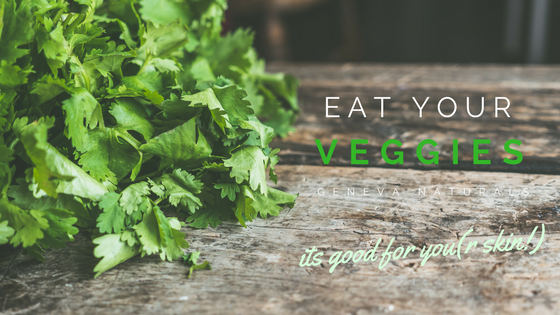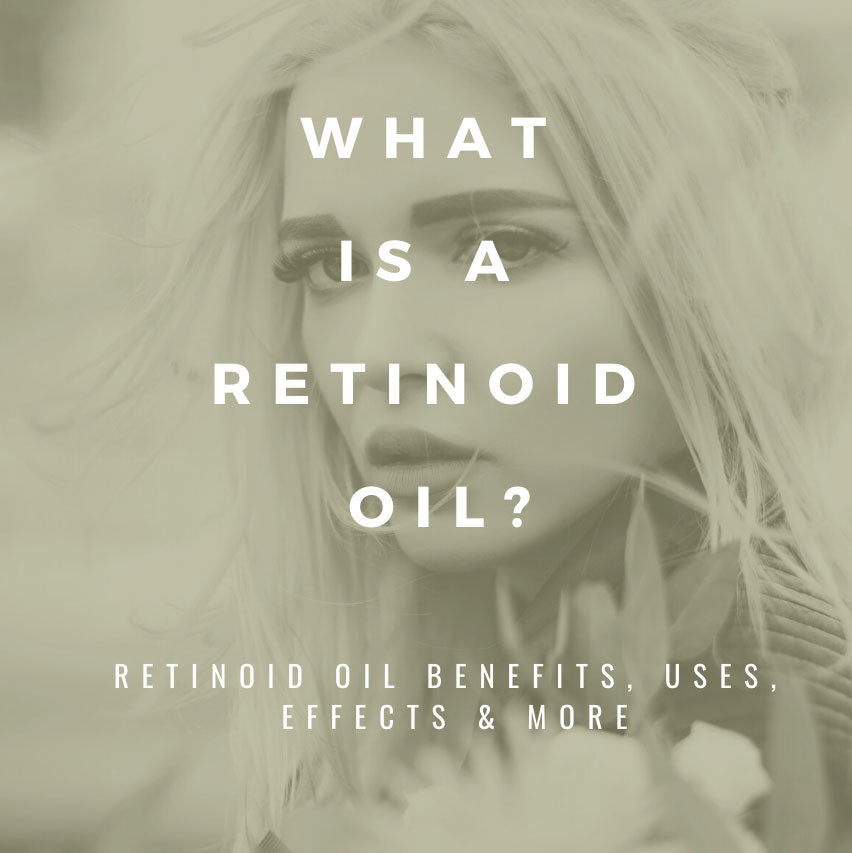Eat Your Veggies, It's Good For You(r Skin!)


Why are we talking about vegetables? *shudder* Well, have you ever heard the phrase, “The garden is the poor man’s apothecary”? It may sound silly and slightly outdated (the phrase apothecary hasn’t been used commonly since the 1800s, we think?), but there is truth to the statement. By eating certain kinds of food, the kinds of foods you can grow in your garden, you’ll find your skin looking healthier and younger. So, listen to your mom and eat your vegetables for good skin!
While it may not sound as glamorous or exotic as the foods you typically hear touted as being good for your health, vegetables are wondrous and easily accessible for everyone. Vegetables have some of the highest levels of nutrients packed into them, which means the more you eat, the more your body can use them to fight the effects of aging, sun, and stress!
So, let’s dig into the benefits of vegetables for your skin!
Why Skin Is Important

In order to understand why the benefits of eating vegetables is so important for your skin, we should probably understand more about how our skin works.
Did you know that your skin is technically considered an organ? Who would have thought! Even though your skin may be on the outside of your body, unlike your other vital organs, it is still an organ, and it is the largest organ of the body. Your skin keeps out toxins, and provides a path for your body to remove toxins that may build up in your body.
Although it may feel like skin is just one thin layer over your muscles and blood vessels (especially when you trip and scrape up your knee, or when you accidentally cut yourself while cooking), it is actually a more complicated a robust organ. You have three layers of the skin – the top layer, or epidermis, the middle layer, or dermis, and the bottom layer, or hypodermis. These layers of skin protect your other organs, ligaments, nerves, and muscles. The epidermis is the layer doing the heavy lifting when it comes to protecting your body. But because it is exposed to the elements, it takes the most wear and tear, which results in wrinkles, sagging skin, sun spots, and all the other signs of aging we’d like to avoid.
The skin is a vital and complex part of our body. But to maintain a healthy body, we need to keep it healthy. Which we do by putting the right things into our body. Like vegetables.
What Vegetables Should You Eat?
Before we start talking about vegetables and you start cringing more and more, check out this video from beauty Melissa Alatorre as she shows you how to make a green smoothie for better skin. This is just to show you that there are so many delicious ways to eat (or drink) your vegetables, so keep an open mind!
So, are all vegetables created equal, or are some better for others when it comes to keeping your skin looking young and radiant? Which ones pack the most punch? Which ones will give you the most results?
In our opinion, the ones we have listed below. Sure, there are a lot of vegetables out there that provide great benefit for your skin, but these pack a pretty good punch, and will leave your body and skin with the tools they need to keep you looking healthy, young, and refreshed, on both the inside and the outside!
Kale
If there is a leafy green vegetable that falls into the camp of you either love it or you hate it, it would be kale. People who hate it can’t stand why so many people love it. For them, kale is a thicker, rough, leafy green with a somewhat bitter taste. People who love it love the numerous health benefits, and the ways you can cook it or combine it with just the right ingredients to make that bitter flavor actually become something delicious.
If you’ve wondered why you see kale listed as an ingredient in many a green smoothie, or in innumerable salads at restaurants, it is because it is a powerhouse plant. If you asked nature to produce you a multivitamin, it would hand you kale, because that is exactly what it is. It is packed with vitamins C, A, and a boatload of fiber!
Sure, you’ve heard about the importance of fiber when it comes to digestion, but how does fiber affect your skin? Well, it is actually because of fiber’s help to your digestive system that your skin benefits. A healthy digestive system means that the nutrients are getting to your skin, and your body is able to successfully flush out anything that isn’t good for your skin. Eating healthy foods with high fiber content means you are supporting that digestive system, which means you are supporting healthy skin.
Vitamin A is rather important in the skin care work, as retinol is a derivative of vitamin A. If you don’t know what retinol is, know that it is one of the few over-the-counter skincare ingredients that has proved to be incredibly effective at reducing the appearance of fine lines and wrinkles. And it is derived from vitamin A. A proven vitamin and product that delivers on its promise is something we can all stand behind!

Avocados
Avocados seem to create two different camps. Those who love them, and those who hate them. They used to get a bad rap back in the day for their fat content, but now that we understand more about the types of fats we ingest, we know that good fat, like the fat found in avocados, is actually good for your body, and your skin! So jump on that avocado bandwagon (we’re looking at you, avocado toast), because you’re about to learn what makes avocados so great for both your skin and your hair.
It’s all about the vitamins when it comes to avocados. They are packed with vitamin K, C, and E. Vitamin C helps our body to produce collagen, which is what keeps our skin looking firm and youthful, and slows down the development of wrinkles.
Vitamin E pumps your body with antioxidants. Antioxidants fight those environmental stressors that your skin is exposed to daily, like pollution and sun exposure. Antioxidants help fight any damaging effects these may have on your skin. Vitamin E also acts as a great moisturizer, which your hair will love!
And lastly, vitamin K. Vitamin K contains anti-inflammatory properties. While applying avocado to a wound or other inflamed area externally may not give you the results you’re hoping for, having avocados as part of your diet can actually help your skin reduce inflammation from acne or other skin problems. For example, this Anti-Aging Under Eye Cream is infused with Vitamin K to help soothe depuff the under eye area. That sounds like a win!

Arugula
Arugula seems to have a troubled history for the average eater. Who can forget the arugula-gate of 2007, when Obama asked if anyone had noticed the price of the leafy green at Whole Foods? While arugula may seem like a food for the few, it has now become so common, you can find it in the produce section of almost every grocery store. Frankly, we’re surprised the U.S. didn’t jump on the arugula bandwagon sooner!
Aside from the fact that arugula is the perfect addition to almost any meal (put it on top of your pork chops. Or some pizza. You can thank us later for those delicious food hacks), it just what the doctor ordered when it comes to your skin. Arugula is packed with sulfur. And not the bad kind of sulfur, the one that has a stench to it, rather the mineral that, along with Vitamin C, helps your body with that collagen production. And, as you know, collagen can make all the difference when it comes to keeping your skin healthy.
Sulfur is also great at fighting bacteria. If you deal with any acne breakouts, you know how important fighting bacteria can be. But bacteria doesn’t just contribute to acne breakouts. Bacteria can cause a lot of damage to the skin, including speeding up the aging process. By keeping your sulfur levels up, you both fight acne and any damaging bacteria. So pick up a pack of arugula and toss it into your next meal, in pretty much any way you can think of. You’ll be glad you did.

Spinach
Now this is a leafy green you’ve almost definitely heard of. Spinach made a big splash in the food world years ago as being healthier than your standard lettuce, like iceberg lettuce. Which spinach is. (Tip for you: the darker green the leafy green, the more nutrients it contains!) You found it in everything, and you still can, because it has become a household vegetable staple. Whether it is cooked into your omelet, blended into your smoothie, or used on your salad, it is ready to get to work to keep your body healthy. For you picky eaters, here are some spinach recipes that taste good. So how can it help you and your skin?
Not only is it loaded with vitamin A (which we already broke down), but it also contains a variety omega-3 fatty acids, which support clear skin with their anti-inflammatory properties. Spinach is a food rich in iron as well, which helps you maintain stronger hair, nails, and skin. Spinach really is the power vegetable Popeye claims it is!
It also contains vitamin C and is full of antioxidants. We already broke those down as well, but needless to say, having those kinds of nutrients running through your body will keep you skin looking flawless and radiant. And, with its more mild flavor, compared to kale and arugula, spinach is easier to incorporate into even the most picky eater’s meal!

Richly-Pigmented Vegetables
While this one may not be one specific type of vegetable for you to focus on, there are certain vegetables that contain the same vitamins and nutrients that continue to help your skin. Pumpkin, carrots, broccoli, and tomatoes all work in unison to provide your skin with some pretty powerful nutrients.
All of these vegetables are rich in lycopene and B-carotene. And why are these important? First, both of these nutrients increase the skin’s ability to defend itself against damage from UV exposure. While we’re certainly not telling you to skip the sunscreen (trust us, you’ll regret it), any helps from preventing sun damage, one of the biggest culprits in the anti-aging battle, is something we can get behind.
But that isn’t the only thing that makes lycopene and B-carotenes so wonderful for your skin. Once you eat these vegetables, your body converts the B-carotenes into one of two things: either as vitamin A (or retinol, covered above), or as an antioxidant, which helps your skin battle all the harmful effects from exposure to the elements. And lycopene, when digested, also works as an antioxidant in your body. Reason enough right there for us to go plant our garden!
Conclusion
Do we like hearing we need to eat more vegetables? For many of us, no. Frankly, it’s hard to find ways to make vegetables taste good, and taste good enough to want to eat them. Finding a motivation to make vegetables part of your daily diet is probably the biggest battle. Sure, you hear about how good they are for your body, but knowing their general health benefits isn’t also enough. For us, knowing that they can play a pretty large role in keeping your skin looking as young, healthy, and radiant as you want it to be is the reason we need to get on board with the whole vegetable push. So cook up those vegetables, because they are one of the many keys to healthy skin!
Still not on board with the vegetable thing? Or maybe need a little extra push to achieve beautiful skin? Try out our most simple skin care regimen, our most stacked value pack with three essential ingredients:
Totally on board with the vegetable thing? Amazing! Let us know in the comments below your favorite recipe with vegetables. We'll try it out on our reluctant friends!
Also in Geneva Naturals

What Is A Retinoid Oil? Retinoid Oil Benefits, Uses, Effects & More

DIY Clay Mask Recipes for Clear Skin



